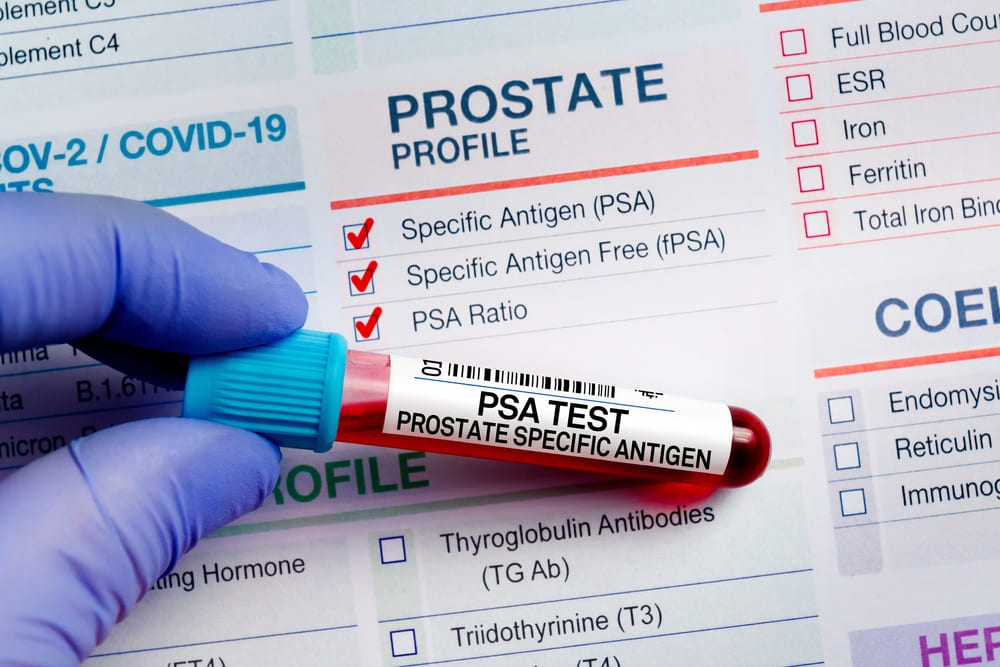Summary: Stress and anxiety may impact PSA levels, potentially leading to higher readings, though the relationship isn’t fully proven. Elevated PSA can arise from various factors, not just prostate issues. Managing stress through mindfulness, exercise, and hobbies can support overall health and prostate care. Regular PSA testing remains key for monitoring changes.
Main Points:
- What is PSA? Protein linked to prostate health; elevated levels don’t always indicate cancer.
- PSA Testing: Useful but has limitations like false positives.
- Stress and PSA: Worry about prostate cancer may elevate PSA; stress can affect health behavior.
- Stress Management: Mindfulness, exercise, hobbies, and social connections help reduce stress.
__________________________________________________________________________________
Prostate-specific antigen (PSA) testing is a key screening measure for prostate cancer, and elevated PSA levels can indicate the presence of other prostate-related issues as well.
However, elevated PSA levels do not only stem from issues with the prostate. PSA levels vary naturally from one man to the next, and a variety of health issues and lifestyle factors can cause an elevated PSA level as well.
So, can stress and anxiety lead to high PSA levels? And do stress and anxiety have an impact on prostate health and the potential for developing prostate cancer?
Keep reading to learn more about:
- PSA itself and PSA testing
- Common causes of elevated PSA levels
- The relationship between stress, anxiety, elevated PSA levels, and prostate cancer
- How to manage stress related to worries about prostate cancer
Understanding PSA Tests and Their Link to Prostate Cancer
What is PSA?
Prostate-specific antigen (PSA) is a protein produced by both normal and malignant (i.e. cancerous) cells in the prostate. PSA makes its way from the prostate into the blood, where it circulates through the body. Every man with a prostate produces PSA, whether they have prostate cancer or not.
As the National Cancer Institute explains, PSA levels in men with prostate cancer are often elevated. However, an elevated PSA level does not confirm prostate cancer by itself.
So, what would cause a high PSA level? Other prostate health issues like benign prostatic hyperplasia (enlarged prostate), health issues unrelated to the prostate like urinary tract infections, certain athletic and sexual activity, and other factors can also lead to an elevated PSA.
PSA levels are expressed as nanograms of PSA per milliliter of blood. The common notation is ng/mL. So, a test result showing 2.5 ng/mL means the individual has 2.5 nanograms of PSA per milliliter of blood.
PSA levels in healthy individuals tend to remain stable over time. However, it’s important to note that expected baseline PSA levels rise as men age. For example, the baseline PSA range for a man aged 40-49 is 0-2.5 ng/mL, while the same baseline range for a man aged 60-69 is 0-4.5 ng/mL.
PSA and Prostate Cancer Screening
While PSA testing by itself cannot confirm the presence or absence of prostate cancer, it’s useful as a frontline screening measure for a few key reasons:
- Testing is simple and does not place high demands on patients, as it only requires a routine blood sample.
- Regular testing can help physicians identify potentially concerning changes over time.
Elevated PSA levels and especially changes in PSA levels that trend upward over time, can indicate prostate health issues. A stable PSA level, even if higher than the baseline expectation, is less concerning than a PSA level that continues to increase with each successive PSA screening.
The limitations of PSA screening include the fact that elevated PSA levels are not exclusively tied to prostate cancer. Additionally, about 75% of positive PSA tests are false positives, as peer-reviewed research published in The Journal of Family Practice explains.
False-positive tests can lead to psychological harm, and physical harm can come from more invasive testing and treatment based on those results. Incorporating genetic analysis into PSA testing — calibrating testing to an individual — may help to address those harms and yield more accurate results.
The Connection Between Stress, Anxiety, and Elevated PSA Level
Exploring the Stress and PSA Relationship
As the Prostate Cancer Foundation (PCF) points out, dealing with a diagnosis of prostate cancer, a type of prostate anxiety, can increase stress for some patients. That’s due to the direct health risks, as well as dealing with insurance providers, trying to manage the disruptions to everyday life, and more.
And, although the relationship is not clear or exhaustively documented through peer-reviewed research, the PCF points out that stress may make prostate cancer worse. The effects of stressful situations and the body’s response to that stress might lead to worse outcomes.
Cortisol can cause disruptions to the immune system and can also change genes expressed in cancer cells, the PCF points out. High levels of stress, and the physiological response that stress causes, may therefore lead to increased progression and aggressiveness of cancer.
So, what about stress and high PSA levels? Could stress and anxiety raise PSA levels? Can stress cause delays in screening or a reluctance to undergo screening for patients? Here’s what we know, based on peer-reviewed research.
Research published in the journal Medical Care found that “perceived stress significantly lowers PSA screening likelihood.” In other words, men are less likely to be screened for prostate cancer using a PSA test when they have high levels of stress. This may be due to stress causing increased difficulty in understanding and appreciating long-term health goals.
While not directly related to PSA levels, the relationship between stress and PSA testing is important to keep in mind from a prostate cancer screening perspective.
Research published in the journal Cancer Epidemiology, Biomarkers & Prevention identified a significant association between worry specifically related to prostate cancer and elevated PSA levels.
In this study, researchers identified several potential risk factors among participants in the study, including perceived cancer risk and the presence of cancer-related symptoms along with worry about prostate cancer. Interestingly, however, the analysis of participant data found that only worry related to prostate cancer had an association with increased PSA levels. In practical terms, this means that patients who have a high level of concern related to prostate cancer, which can be framed as similar to stress, display elevated PSA levels
It’s important to note that the study was controlled for factors including past screening results, screening behavior, age, and reasons for seeking screening. The conclusion was that “the present findings suggest that prostate cancer-specific worry was associated significantly with an abnormal PSA level.”
Separate research published in the journal Brain, Behavior, and Immunity did not identify a connection between distress related to prostate cancer and PSA levels measured at initial screening and after a prostate biopsy. This held true regardless of the eventual diagnosis — whether the participants had prostate cancer or not.
However, the study did identify a connection between possible clinical depression identified at the point of initial testing and an increased incidence of prostate cancer diagnosis. Specifically, men designated as possibly having clinical depression had a 23% higher chance of receiving a prostate cancer diagnosis.
Can Stress and Anxiety Raise PSA Levels?
Stress and anxiety may lead to higher PSA levels, although that relationship has not been conclusively and exhaustively proven. While that statement is not the same as saying that stress and anxiety lead to prostate cancer, it’s worth noting that stress and anxiety are generally regarded as having a negative overall impact on health. Chronic stress can make it more difficult for the body to operate as it should because of the influence of cortisol and similar hormones, which are released as a reaction to mental stress.
Additionally, chronic stress can interfere with cancer reducing healthy habits and lifestyle choices. As the National Cancer Institute explains, the relationship between stress and general cancer risk may be indirect. Stress may encourage unhealthy behaviors and coping mechanisms, like poor diet, smoking, drinking, and insufficient exercise.
Practical Steps for Reducing Stress
There’s no argument about the benefits of reducing and avoiding chronic stress. Putting less pressure on the mind and body can help with general health and may support better outcomes related to prostate cancer.
Wondering about how to reduce stress in daily life? This process isn’t always easy, especially when external factors that can cause stress — career, family, finances, and more — cannot be fully controlled. However, there are practical ways to address stress and reduce its impact. These include:
- Identifying the causes of stress. Often, a clear understanding of the underlying causes of stress can be beneficial in reducing it. In some cases, stress may be alleviated or avoided altogether. And, noticing what causes stress may help to change behavior and the stress response through better understanding and mindfulness.
- Meditation, deep breathing, and similar exercises. The Cleveland Clinic points out that activities ranging from meditation to massages can lower heart rates and calm minds
- Physical exercise. Physical activity, from hiking to workout routines and individual and team sports, can improve mood and act as a stress-release valve of sorts.
- Cultivate and enjoy hobbies. The Mayo Clinic points to enjoyable activities and personal passions as effective ways to manage and combat stress.
- Prioritizing quality time with loved ones and friends. Setting aside time for friends and family is another effective way to manage stress.
PSA Test Results and Treatment Options
Prostate Laser Center is dedicated to providing qualified patients with minimally invasive treatment options that compare favorably to traditional treatments in terms of the incidence of side effects.
Learn more about our approach to prostate cancer treatment and find out if you may qualify by scheduling a consultation today.
NOTE: The information provided on this website is general medical information and does not establish a physician-patient relationship. Please discuss your particular situation with a qualified medical professional.



